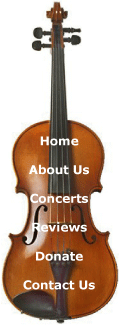

Concert
Review
Met audience feasts on Czech delicacies
By Travis
Rivers
Correspondent
The Spokesman-Review
Feb. 27, 2006
Concert programs sometime seem like restaurant menus; they even look a bit like menus but without the prices. The Spokane String Quartet and guest pianist Kendall Feeney treated their Met Theatre audience to a beautifully prepared Czech banquet Sunday. The music included rich 19th-century Bohemian fare by Antonin Dvorak and tartly spiced 20th-century music by Bohuslav Martinu.
The quartet – made up of violinists Kelly Farris and Tana Bland, violist Jeannette Wee-Yang and cellist Helen Byrne – opened with a selection of appetizers, seven short arrangements the mature Dvorak made of songs he had written when he was only 22 and madly in love with a young actress named Josefina Cermakova. She rejected the young Dvorak, but he later married her sister Anna.
Titled "Cypresses (Song Echoes)," these string quartet arrangements furnish the players the chance to display a lyric tone and provide a colorful background in the accompaniments. Farris and Wee-Yang got most of the good tunes and "sang" them lovingly. There was a bit of dancing, too, in the polka of No. 5 and in the ardent finale.
Bland and
Wee-Yang brought the Czech spirit into the 20th century with Martinu's "Three Madrigals for Violin and Viola." Two generations
separate Dvorak and Martinu, but the rhythmic peculiarities of Czech
poetry and dance unite them.
Both performers took up Martinu's delightfully spicy harmonic clashes
and his liking for the boldness of folk fiddling. I was especially
taken with their long chains of muted trills and tremolos in the middle
movement
suggesting humming insects on a summer night. And the chasing figures
that bounced from violin to viola and back in the finale were a treat,
especially when Martinu coyly quoted from Paganini's "La Chasse" to
underline his rush.
Byrne was joined by Feeney for a stylish and colorful performance of Martinu's "Variations on a Slovak Folksong." Martinu completed these variations only a few weeks before his death, and ironically the text of the song begins "Had I but known ...." But there was nothing morbid about these variations or the color and energy Byrne and Feeney brought to this infrequently performed work.
The concert concluded with the lavish main course presentation of Dvorak's "Trio in E minor, Op. 90," a big work made up of six large-scale dumkas, hence its nickname, "The Dumky." The trio was brilliantly performed by Farris, Byrne and Feeney. The range of emotions Dvorak covered was huge. Sunday's performance gave it the air of an Irish wake with somber and sad recollections, then the outbreak of merriment and dancing fed by strong drink.
The challenge is to make the disparate moods take shape. Sunday's trio let that happen with the apparently artless flow of three experienced storytellers. The art came in the players' split-second timing and a technical sheen that gave the succession of moods a sense of inevitability.
Excellent chamber music performances like this one of such unusual musical fare deserve a full house rather than the skimpy audience at The Met on Sunday.
[Home] [About Us] [Concerts] [Reviews] [Donate] [Contact Us]
Spokane
Chamber Music Association
P.O. Box 3741
Spokane, WA 99220-3741